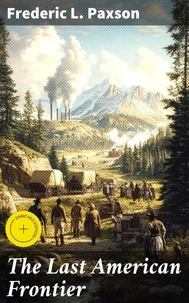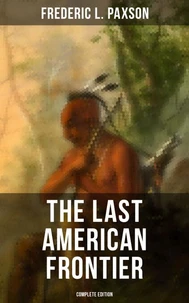THE LAST AMERICAN FRONTIER. The History of the 'Far West', Trials of the Trailblazers and the Battles with Native Americans
Par :Formats :
Disponible dans votre compte client Decitre ou Furet du Nord dès validation de votre commande. Le format ePub est :
- Compatible avec une lecture sur My Vivlio (smartphone, tablette, ordinateur)
- Compatible avec une lecture sur liseuses Vivlio
- Pour les liseuses autres que Vivlio, vous devez utiliser le logiciel Adobe Digital Edition. Non compatible avec la lecture sur les liseuses Kindle, Remarkable et Sony
 , qui est-ce ?
, qui est-ce ?Notre partenaire de plateforme de lecture numérique où vous retrouverez l'ensemble de vos ebooks gratuitement
Pour en savoir plus sur nos ebooks, consultez notre aide en ligne ici
- Nombre de pages248
- FormatePub
- ISBN859-65--4775176-2
- EAN8596547751762
- Date de parution13/12/2023
- Protection num.Digital Watermarking
- Taille1 Mo
- Infos supplémentairesepub
- ÉditeurDIGICAT
Résumé
In "The Last American Frontier, " Frederic L. Paxson delivers a meticulously researched exploration of the closing of the American West during the late 19th century. Combining a narrative style that oscillates between historiography and vivid storytelling, Paxson examines the socio-political forces that influenced the Westward expansion and its ultimate implications for American identity. He intricately weaves together economic, cultural, and environmental factors, illustrating how the frontier served as both a physical and symbolic space for determined settlers and indigenous populations alike.
Through a rich tapestry of primary sources, Paxson provides an insightful critique of manifest destiny and its consequences, positioning the frontier as a microcosm of broader American ideals and conflicts. Frederic L. Paxson was an esteemed historian whose academic career was shaped by a profound interest in American history and regional cultures. His extensive studies in Western history culminated in this landmark work, driven by a desire to elucidate the complexities of the American experience during a time of rapid change.
Paxson's role as a professor and his commitment to unearthing underrepresented narratives infused his writing with a sense of empathy and insight, reflecting the varied experiences of those who inhabited the ever-shifting frontier. I highly recommend "The Last American Frontier" to scholars, history enthusiasts, and anyone seeking to understand the intricate tapestry of American expansion. Paxson's engaging prose and thorough analysis make it a vital addition to both academic libraries and personal collections, fostering a deeper appreciation for the nuances of America's historical landscape.
Through a rich tapestry of primary sources, Paxson provides an insightful critique of manifest destiny and its consequences, positioning the frontier as a microcosm of broader American ideals and conflicts. Frederic L. Paxson was an esteemed historian whose academic career was shaped by a profound interest in American history and regional cultures. His extensive studies in Western history culminated in this landmark work, driven by a desire to elucidate the complexities of the American experience during a time of rapid change.
Paxson's role as a professor and his commitment to unearthing underrepresented narratives infused his writing with a sense of empathy and insight, reflecting the varied experiences of those who inhabited the ever-shifting frontier. I highly recommend "The Last American Frontier" to scholars, history enthusiasts, and anyone seeking to understand the intricate tapestry of American expansion. Paxson's engaging prose and thorough analysis make it a vital addition to both academic libraries and personal collections, fostering a deeper appreciation for the nuances of America's historical landscape.
In "The Last American Frontier, " Frederic L. Paxson delivers a meticulously researched exploration of the closing of the American West during the late 19th century. Combining a narrative style that oscillates between historiography and vivid storytelling, Paxson examines the socio-political forces that influenced the Westward expansion and its ultimate implications for American identity. He intricately weaves together economic, cultural, and environmental factors, illustrating how the frontier served as both a physical and symbolic space for determined settlers and indigenous populations alike.
Through a rich tapestry of primary sources, Paxson provides an insightful critique of manifest destiny and its consequences, positioning the frontier as a microcosm of broader American ideals and conflicts. Frederic L. Paxson was an esteemed historian whose academic career was shaped by a profound interest in American history and regional cultures. His extensive studies in Western history culminated in this landmark work, driven by a desire to elucidate the complexities of the American experience during a time of rapid change.
Paxson's role as a professor and his commitment to unearthing underrepresented narratives infused his writing with a sense of empathy and insight, reflecting the varied experiences of those who inhabited the ever-shifting frontier. I highly recommend "The Last American Frontier" to scholars, history enthusiasts, and anyone seeking to understand the intricate tapestry of American expansion. Paxson's engaging prose and thorough analysis make it a vital addition to both academic libraries and personal collections, fostering a deeper appreciation for the nuances of America's historical landscape.
Through a rich tapestry of primary sources, Paxson provides an insightful critique of manifest destiny and its consequences, positioning the frontier as a microcosm of broader American ideals and conflicts. Frederic L. Paxson was an esteemed historian whose academic career was shaped by a profound interest in American history and regional cultures. His extensive studies in Western history culminated in this landmark work, driven by a desire to elucidate the complexities of the American experience during a time of rapid change.
Paxson's role as a professor and his commitment to unearthing underrepresented narratives infused his writing with a sense of empathy and insight, reflecting the varied experiences of those who inhabited the ever-shifting frontier. I highly recommend "The Last American Frontier" to scholars, history enthusiasts, and anyone seeking to understand the intricate tapestry of American expansion. Paxson's engaging prose and thorough analysis make it a vital addition to both academic libraries and personal collections, fostering a deeper appreciation for the nuances of America's historical landscape.



